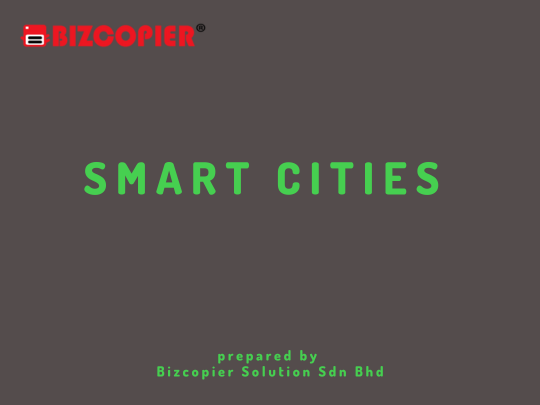Smart Cities

A smart city is a urban area that uses technology and data-driven solutions to enhance the quality of life for its residents, optimize resource efficiency, and improve urban services and infrastructure. The goal of a smart city is to create a more sustainable, efficient, and livable urban environment by leveraging technology, data, and connectivity. Here’s a detailed explanation of smart cities:
Key Components of Smart Cities:
Information and Communication Technology (ICT): Smart cities rely on advanced ICT infrastructure, including high-speed internet connectivity, sensors, data collection devices, and communication networks. These technologies enable the collection, analysis, and sharing of data across various sectors.
Data Collection and Analytics: Smart cities use sensors, cameras, and other data collection devices to gather real-time information about traffic, air quality, energy usage, waste management, and more. This data is then analyzed to gain insights and inform decision-making.
Connectivity: A fundamental aspect of smart cities is connectivity, which enables seamless communication between devices, systems, and citizens. This includes IoT (Internet of Things) devices that can monitor and control various aspects of urban life.
Smart Infrastructure: Smart cities invest in modern infrastructure, such as energy-efficient buildings, intelligent transportation systems, renewable energy sources, and optimized waste management systems.
Urban Mobility: Smart cities prioritize efficient transportation systems, including smart traffic management, public transportation, ride-sharing services, and the promotion of pedestrian and cycling infrastructure.
Energy Efficiency: Energy consumption is optimized through the use of smart grids, energy-efficient lighting, and renewable energy sources, reducing the city’s environmental footprint.
Governance and Services: Smart cities use digital platforms to improve government services and citizen engagement. E-governance tools streamline administrative processes and provide easy access to public services.
Safety and Security: Smart cities deploy advanced surveillance systems, emergency response networks, and predictive analytics to enhance public safety and disaster management.
Sustainability: By optimizing resource use and reducing waste, smart cities work towards greater sustainability and a reduced ecological impact.
Benefits of Smart Cities:
Improved Quality of Life: Smart cities focus on enhancing the well-being of residents by providing efficient services, reducing traffic congestion, improving air quality, and ensuring access to essential amenities.
Resource Efficiency: The use of data and technology allows smart cities to optimize resource utilization, leading to energy savings, reduced water consumption, and more efficient waste management.
Economic Growth: Smart cities can attract investment and foster innovation, leading to economic growth and job creation in technology-related sectors.
Environmental Sustainability: Smart cities aim to minimize their environmental impact by reducing carbon emissions, promoting sustainable transportation, and utilizing renewable energy sources.
Responsive Governance: Digital platforms enable citizens to engage with local authorities, participate in decision-making, and provide feedback, leading to more responsive and transparent governance.
Challenges and Considerations:
Implementing a smart city framework requires overcoming challenges such as data privacy concerns, digital inequality, cybersecurity risks, and the need for extensive infrastructure investments. Ensuring inclusivity, involving citizens in planning, and addressing potential drawbacks are crucial for successful smart city initiatives.

*Other Model Available
RICOH MPC3503/ MPC5503 | RICOH MPC3504/ MPC5504
CONTACT US: 03-3341 6296 | 018-788 6296 | 018-228 6296




BIZCOPIER copier purchase klang MPC3503 MPC3504 MPC5503 MPC5504 rent ricoh copier rental and purchase scheme ricoh copier

Recent Comments